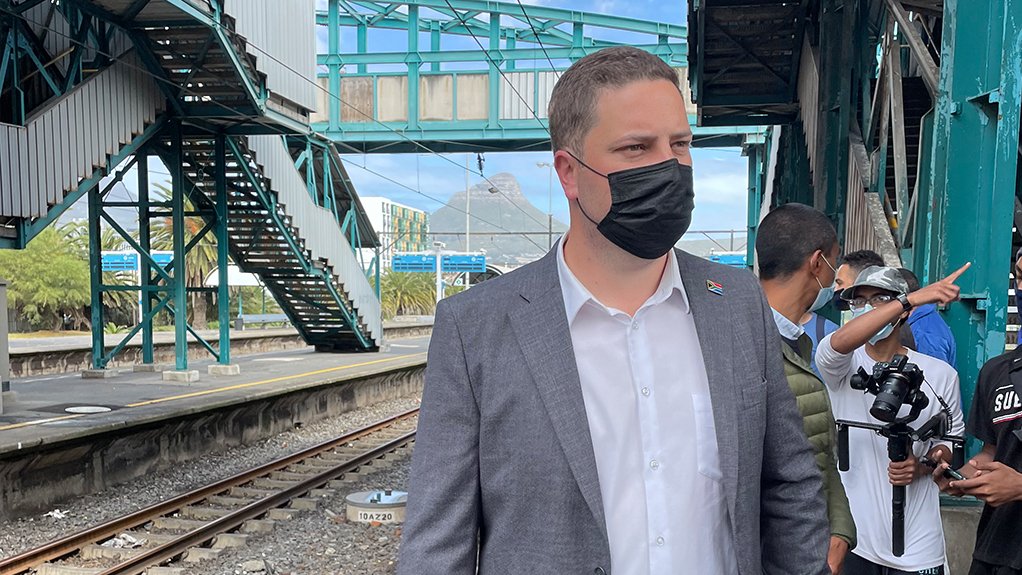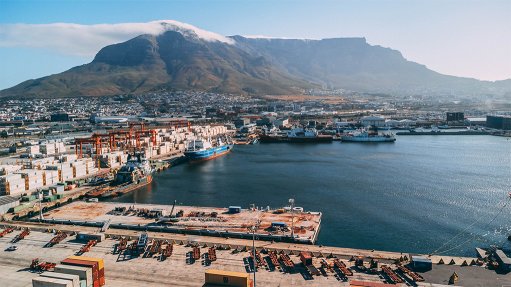Cape Town to start Metrorail take-over feasibility study on July 1
The City of Cape Town will, on July 1, start a feasibility study on the devolution of the city’s passenger rail system from the Passenger Rail Agency of South Africa (PRASA) to the metro.
PRASA currently operates all commuter passenger rail systems in the country, with the exception of the Gautrain.
“The contract for the rail devolution feasibility study was recently awarded to an external service provider,” Cape Town Mayor Geordin Hill-Lewis tells Engineering News Online.
“The full time allotted for the study is three years, but we are hoping to conclude it sooner.”
A large urban rail system is a complex service, notes Hill-Lewis.
“We do not currently know the status and value of all the assets in the system, for example, and how much investment is required in terms of repairing and replacing infrastructure. Our first step, therefore, is to conduct a feasibility study to clarify all of these details.
“Once the study’s preliminary results start coming in, we will have a much better idea about overall timelines for the rail devolution project.”
The newly published White Paper on National Rail Policy allows for the devolution of PRASA’s passenger rail systems to local councils through a process that includes a feasibility study.
Hill-Lewis says the City of Cape Town (CoCT) is “committed to taking over rail in Cape Town because it is in a shambles”.
“We don’t have a choice but to do what we can to fix it. The problem is that the national government’s mismanagement of Metrorail, in the past decade especially, has left us with just 33 operational train sets in Cape Town in 2020, compared to 95 in 1995.”
In 2019, Metrorail was operating 444 weekday trips, which fell to 270 in 2020 before the pandemic.
“Now, in 2022, there are around 150 weekday trips on average,” says Hill-Lewis.
“The Central Line is no longer running, and some other lines are operating on limited service. Even before 2019, when the rail service was already known to be unsafe and unreliable, up to 500 000 commuters used Metrorail trains in the Western Cape every day.
“Once we restore the system and improve it to the extent that it will become a viable alternative to road-based travel – getting people out of cars and into trains – we may see 600 000 to 700 000 people using rail every day in the metro alone.”
Hill-Lewis emphasises that safe, reliable and affordable public transport is a fundamental requirement for the success of any major city.
“It is impossible to get people to work and perform other basic human functions without adequate mobility.
“Accordingly, the city’s economy is highly dependent on a well-functioning public transport system. The question then, is, what kind of public transport system should we have?”
Hill-Lewis says that Cape Town is “by far” the most congested city in the country, with no room to expand most of its main roads.
“It is impossible for roads to remain our primary means of mobility as Cape Town continues to grow.
“The only mass mover of people that has proven itself to be safe, reliable and effective in cities where this is the case is rail.
“We have an extensive and established commuter rail network that has existed for over 150 years. If we want to ensure Cape Town’s success, we need to reverse rail’s decline and get the system functioning even better than it was before.”
But What Will It Cost?
The devolution of the commuter rail function from the national government would have to be accompanied by the handover of the budget for that function from the national fiscus, explains Hill-Lewis.
“It would be impossible for the city to administer urban rail within its current budget.
“This is an example of a question that will be answered in much more detail by the feasibility study as the specifics are unclear at this stage.
“It is, however, quite clear that our future model for rail administration will depend heavily on private sector partnerships (as concessionaires or otherwise) and investment.”
First Priority
Once CoCT takes over the functioning of Metrorail within the city, the city’s first priority would be to get the basics right, says Hill-Lewis.
“And, when it comes to trains, the most basic requirement is that the trains must actually run.
“This means that we need to get those lines that have stopped running due to mismanagement back up and functioning.
“Beyond that, stations, carriages, and infrastructure must be safe and secure, and trains must run on time and often enough to make them a viable mode of transport for commuters.
“Thereafter, we must ensure that the trains integrate as seamlessly as possible into other available modes of transport, including busses and taxis,” notes Hill-Lewis.
Comments
Announcements
What's On
Subscribe to improve your user experience...
Option 1 (equivalent of R125 a month):
Receive a weekly copy of Creamer Media's Engineering News & Mining Weekly magazine
(print copy for those in South Africa and e-magazine for those outside of South Africa)
Receive daily email newsletters
Access to full search results
Access archive of magazine back copies
Access to Projects in Progress
Access to ONE Research Report of your choice in PDF format
Option 2 (equivalent of R375 a month):
All benefits from Option 1
PLUS
Access to Creamer Media's Research Channel Africa for ALL Research Reports, in PDF format, on various industrial and mining sectors
including Electricity; Water; Energy Transition; Hydrogen; Roads, Rail and Ports; Coal; Gold; Platinum; Battery Metals; etc.
Already a subscriber?
Forgotten your password?
Receive weekly copy of Creamer Media's Engineering News & Mining Weekly magazine (print copy for those in South Africa and e-magazine for those outside of South Africa)
➕
Recieve daily email newsletters
➕
Access to full search results
➕
Access archive of magazine back copies
➕
Access to Projects in Progress
➕
Access to ONE Research Report of your choice in PDF format
RESEARCH CHANNEL AFRICA
R4500 (equivalent of R375 a month)
SUBSCRIBEAll benefits from Option 1
➕
Access to Creamer Media's Research Channel Africa for ALL Research Reports on various industrial and mining sectors, in PDF format, including on:
Electricity
➕
Water
➕
Energy Transition
➕
Hydrogen
➕
Roads, Rail and Ports
➕
Coal
➕
Gold
➕
Platinum
➕
Battery Metals
➕
etc.
Receive all benefits from Option 1 or Option 2 delivered to numerous people at your company
➕
Multiple User names and Passwords for simultaneous log-ins
➕
Intranet integration access to all in your organisation





















